- Home
- Francine Rivers
Unafraid_Mary Page 2
Unafraid_Mary Read online
Page 2
Mary drew in her breath with a smile and clasped her hands. Oh! She knew how Elizabeth had always longed for a child. Nothing was impossible with God! Elizabeth would be like Sarah, who bore Isaac in her old age. She would be like Hannah, dedicating her son to the Lord. The news made Mary’s faith leap. She wanted to race to Elizabeth and see this miracle for herself, but the angel stood in front of her, silent, waiting for her answer.
If she said yes, she would become the mother of the long-awaited Messiah. Why the Lord had chosen her to be part of his plan she couldn’t even guess. She was uneducated, poor, and lived in an obscure village that most Jews disdained. Yet she also knew from listening to Scripture readings in the synagogue that God often used the most unlikely and unworthy to fulfill his purposes. It didn’t matter who she was. God would accomplish his purposes in his way. The angel of the Lord was asking her to be part of God’s plan. And everything within her heart and soul cried out a joyous yes.
Do you really think you can be the Messiah’s mother? Do you think you will know how to rear God’s Son to be king over Israel? The dark voices again.
No. I won’t, her heart answered. But God will.
Gathering her courage, Mary looked up. “I am the Lord’s servant.” She spread her hands. “And I am willing to accept whatever he wants. May everything you have said come true.”
As soon as she made her decision, the angel was gone. She uttered a soft gasp of dismay. She would have thought she imagined the entire episode had not the air still trembled around her. Shaken, she clutched her hands against her chest until she remembered the angel of the Lord had said not to be afraid. Letting out her breath softly, she knelt and lifted her face to heaven. She lifted her hands, palms up. Lord, your will be done.
Her skin tingled strangely as she saw a cloud coming down. She placed her hands over her heart as she was overshadowed. Closing her eyes, she breathed in the scent of spring flowers, earth, and the heavens. Her skin warmed as her body was flooded with sensation. She drew in her breath and held it. For one brief space in time, nothing moved; no sound was heard as all creation paused.
Within the womb of a poor peasant girl from an obscure village in Galilee, God the Son became one with the seed of Adam.
Joseph glared at Mary. “How can you expect me to believe such a story?” All his hopes for a bright future were demolished. He would never have thought a girl like Mary—so young, so sweet, so devout—could betray him in so foul a manner. Pregnant! He was attacked by emotion, shaken by it. He shut his eyes, fighting against the violent thoughts filling his mind: Denounce her! Cast her aside! Report her to the rabbi! Have her stoned!
“No!” he cried out, putting his hands over his ears. He opened his eyes and saw Mary’s mother, Anne, cowering and weeping in the corner.
Only Mary was calm. “You will believe, Joseph.” She looked up at him, her dark eyes innocent. “You will. I know you will.”
How could she appear so calm when, with one word, he could have her killed?
“There is only one way a woman conceives.”
“For God, anything is possible.”
“And God would choose you to bear the Messiah?”
She laughed at his sarcasm, her face filled with joy. “Hasn’t God always chosen the weak to confound the strong? Oh, Joseph.” She clasped her hands, excitement radiating from her. “Think of him. God never chooses as man would choose.”
“I can’t believe this. I can’t! It defies all reason!” He had to get out of this house. He couldn’t look at her and think clearly.
“Joseph!” Anne rose and came after him. “Joseph! Please!” She cried out as he went out the door and left it ajar behind him. “Joseph!”
He ducked around the corner and walked quickly away, heading up a narrow street toward the end of town. He didn’t want people noticing he was upset and asking questions. He had to think!
Out of sight of Nazareth, he wept. What should he do now? Forget she was the daughter of a man who had befriended him, a man who was of his own tribe? Could he ignore the fact that she was pregnant with another man’s child? She had committed a sin of abomination! She was unclean! If he married Mary now, people would point the finger at him. Both their reputations would be ruined. The gossip would circulate for years to come. And when the child was born, what then? Everyone would know he was conceived before the wedding ceremony, and would whisper behind their hands as he passed.
Why were women such weak vessels, so easily deceived? He kicked the dirt angrily. Who could have done this to her? Who would dare take advantage of an innocent, fatherless girl? And why would she concoct such a ridiculous, outlandish lie to cover up her sin? He grimaced. An angel came and told her she was to bear the Son of God! What man in his right mind would believe such a story?
When Joachim had offered Mary to him, Joseph thought he’d been offered a future and a hope. Now, he held disaster in his hands. If he exposed her, he would have to stand by and watch the daughter of Joachim stoned to death for the sin of fornication. And the child she carried would die with her.
Yes! Do it! rasped the dark foreign voice. Why shouldn’t she die for betraying you and her father? Why shouldn’t she be cut off from Israel for rejecting the Law you live by? Kill her! Kill the child!
The violence in his thoughts frightened Joseph and he cried out, “Oh, God, help me! What should I do? Why do you throw this catastrophe at my feet? Haven’t I tried all my life to do right? to live according to your law?” He sat, dragging his fingers through his hair. Gritting his teeth, he wept angrily. “Why, Lord? Make me understand!”
The sun set, but he was no closer to an answer. Weary, Joseph rose and walked back to town. The streets were empty, for it was late and everyone had returned home. He entered his workshop and sat at his worktable. He’d never felt so alone. “Where are you, God? Where are you when I need your counsel?” He considered going to the rabbi for advice, but rabbis could not always be trusted to keep confidences. Joseph wanted no one else to know about Mary until he had decided what to do. He ran his hand over the yoke he had been carving, then picked up his tools. Perhaps work would ease his mind.
Who was he to condemn Mary?
Joseph followed the Law, but he knew in his heart that it was only on the surface. Beneath the dutiful hours in synagogue, the giving of tithes and offerings, his heart was rebellious against the yoke of Rome, the yoke of corrupt rabbis, and the weight of the Law itself. How could any man help it? Sin taunted Joseph every time he saw a Roman soldier mocking a woman at the well, or a rabbi haranguing some poor widow for her tithe, or a rich patron who ignored what was owed for work rendered, or a beggar who cursed him when he had no money to give. Though Joseph had taken countless lambs to the Temple in Jerusalem for sacrifice over the years, he had never felt completely cleansed of sin. The blood of the sacrificial lamb covered it over, and then he’d sin again. He wanted to do right, but he found himself failing again and again.
Stretching out on his pallet, Joseph flung his arm over his eyes, still undecided what action to take regarding Mary. The Law was clear, but his heart was torn. He closed his eyes, hoping sleep would enable him to think more clearly in the morning. But his sleep was tormented by nightmares. He heard angry voices and a girl screaming. He cried out, but when he tried to run, his feet sank into sand. As he struggled, darkness surrounded him and someone spoke from it. Kill the girl. Kill her and the spawn she carries!
“Joseph, son of David,” came another voice he’d never heard before, but knew instantly. A man in shimmering white stood above him. “Do not be afraid to go ahead with your marriage to Mary. For the child within her has been conceived by the Holy Spirit. And she will have a son, and you are to name him Jesus, for he will save his people from their sins.”
Joseph absorbed the words, his soul trembling with delight. All his life he had heard people talk of the coming Messiah. Since the time of David, the Jews had waited for another king to triumph over Israel’s enemies. And more than
that, the promised Messiah would reign over all the earth. Now the time had come, and God was sending the Anointed One. And Joseph would see him. He would stand at the side of the Messiah’s mother and protect the Chosen One as his own son.
You, a simple carpenter, stand as guard? Dark laughter surrounded him, and Joseph moaned in his sleep. I will kill them. And you, if you stand in my way.
Joseph groaned again and rolled onto his back. He opened his eyes and felt the darkness around him. Fear gripped him, until a whisper pierced it.
He will save his people from their sins. . . .
Joseph’s longing for righteousness welled up in him like the thirst of a man lost in the desert. And he remembered the words of his ancestor, David, whispering them into the darkness: “Those who live in the shelter of the Most High will find rest in the shadow of the Almighty. . . . I will not be afraid of the terrors of the night, for God will order his angels to protect his Son. The Lord himself will guard him.”
The darkness rolled back, and Joseph saw the stars through his window. He stared at them for a long while. Smiling, he went back to sleep.
Anne wept in relief, but Mary seemed not the least surprised by Joseph’s decision to marry her quickly. In fact, she crossed the room and put her hand on his arm, surprising him with a demand. “I must go to my relative Elizabeth.”
Her mother protested. “Why would you want to go there? The hill country is a hard journey—”
“Oh, Mother, it doesn’t matter. Elizabeth is with child!”
“Don’t be ridiculous! She’s long past her time of bearing children.”
“The angel told me she’s with child.”
“And what do you suppose people will say when you suddenly marry Joseph and then go off to the hill country of Judea?”
“What does it matter what people say if it’s the Lord’s will I go?”
Joseph saw how the journey could solve several problems. The angel had said nothing about announcing to the citizenry of Nazareth that Mary had conceived by the Holy Spirit and would give birth to the Messiah. What if the news did get out? What sort of dangers might present themselves to the child? When Mary’s pregnancy became apparent, there would be gossip. However, if they went on this journey together . . .
“As soon as we are married, I will take Mary to visit her relative.”
“People will talk,” Anne said.
Yes, people would talk, but the condemnation would be aimed at him rather than Mary.
When Mary’s pregnancy became apparent, some in Nazareth thought they now understood the reason for Joseph’s haste in marrying her. Women whispered at the well while the men shook their heads and clucked their tongues in the synagogue. What did anyone really know about Joseph, other than that he was a carpenter come from Bethlehem? Poor Joachim. The man had trusted the carpenter because he was a relative, a descendant of David. Surely Joachim’s bones were crying out now that it was evident Joseph had taken conjugal rights before those rights were due. Some went to the rabbi and insisted the couple be disciplined so that other young people wouldn’t think such behavior was condoned in Nazareth! The rabbi said Joseph had acted within his rights under the contract, gifts having been exchanged and documents signed.
A voice came out of the shadows at the back of the synagogue. “Will you not destroy the evil among you?”
The rabbi raised his head from the Torah. “Who speaks?”
“Does Scripture not say the Lord hates haughty eyes and a lying tongue?” The voice was deep and dark and familiar to many. “We must destroy the wickedness among us.” Men glanced at one another and voices began to swell as the accuser remained in the shadows. “Who is this carpenter who defies the Law? Who is this girl who plays the harlot?”
A man stood, face flushed. “He’s right!” Others joined in agreement.
Chilled, the old rabbi raised his hands. “The Law also says there shall be two witnesses. Let them come forward.”
A low rumble moved through the gathering of men, but no one moved. Men looked about. Trembling, the rabbi rolled open the Torah. “The Lord also hates a false witness who pours out lies, a person who sows discord among brothers.” He spoke quietly, but the words carried.
The accuser departed.
Soon after, all gossip regarding Joseph and Mary died when Roman soldiers arrived in Nazareth carrying a decree from Caesar Augustus. A census of all who inhabited the earth was being taken. Men cried out in dismay. Did this Roman “god” realize what chaos his decree would create? For the order was that everyone must return to the village of his birth in order to be counted.
JOSEPH had dreaded this moment since he’d heard the decree read. He looked between the two women at the table—one so young and lovely his heart turned over, the other older and aggrieved over the cruel things said about her daughter during the past few weeks. “We must go to Bethlehem,” he said into the silence. He explained the situation to both women. Mary glanced at her mother, but Anne sat shaking her head.
“Mary’s time is close, Joseph.”
“We must obey the law.”
“Whose law must we obey? Should you risk my daughter for the sake of a Roman emperor, a pagan idolator who thinks he is a god?”
Joseph leaned forward and put his hand over Anne’s. “Scripture is being fulfilled, Mother.” He had heard from the time he was a little boy that Bethlehem would one day be the site of the Messiah’s birth. “The prophet Micah said, ‘But you, O Bethlehem Ephrathah, are only a small village in Judah. Yet a ruler of Israel will come from you, one whose origins are from the distant past. . . . And he will stand to lead his flock with the Lord’s strength.’”
Mary’s eyes lit up as she looked at Joseph. She turned excitedly to her mother. “You can come with us, Mother. Come and see the great day of the Lord being fulfilled.”
“Yes,” Joseph said, pressing Anne’s hand slightly. “Come with us.”
“No.” She jerked her hand from beneath his. “I belong here in Nazareth. And so does Mary!” Joseph watched her rise and turn her back. She wrapped her arms around herself and raised her head. “How can you even consider such a journey when Mary is so close to her time?”
He understood Anne. She was a mother and did not want to let her favorite daughter go. “If you cannot see this as fulfillment of Scripture, look upon it as a means of escaping the gossip surrounding our marriage.”
Anne turned on him. “So you’re thinking only of yourself! You care nothing about the dangers to her.”
“Mother!” Mary said in surprised protest.
Her mother looked at her beseechingly. “You can’t even consider it, Mary. And you,” she said, glaring at Joseph again, “I can’t believe you’d think of taking Mary from me now when she will need me more than ever.”
Mary blinked and looked at Joseph. He lowered his eyes, searching himself frantically to find any truth to Anne’s words. Was he wrong in the way he saw this decree? Was he jeopardizing Mary’s life for the whim of a foreign emperor? Should he discount the prophecy about Bethlehem and delay the journey another week?
Mary tilted her head. “I must go where my husband goes.”
“You must stay here and wait until the child is born.”
“Have you forgotten Ruth?”
“Don’t speak to me of Ruth,” her mother said angrily. “That was a long time ago. And she was leaving pagan parents for the sake of her mother-in-law, who had taught her about the Lord.”
“Mother, please listen,” Mary said gently.
“No!” Anne covered her face, her shoulders shaking as she wept. “I thought there would be no greater honor than for my daughter to bear the Anointed One, but my heart is being torn from me. How will I know that you’re well and safe?”
Mary took her mother’s hand and pressed it to her cheek. “Will the Lord himself not watch over his own Son? Has the Lord ever made a promise he did not keep?”
Joseph saw anguish in Anne’s eyes as she cupped her daughter’s cheek. J
oseph had heard that giving birth was an excruciating process, one that endangered the mother as well as the child. Who would act as midwife? “Please, Anne. Come with us.”
His mother-in-law considered a moment and then shook her head slowly, decisively. “Joachim was born here, Joseph, and so was I. I must remain here, as surely as you must return to Bethlehem. Perhaps this is the Lord’s way of making me let go of my daughter.” Her lips curved sadly. “Does not Scripture say a man and woman are to leave their fathers and mothers and be joined to one another?” She tipped Mary’s face. “You are right, my precious one. You must go with your husband. Your sister and her husband will watch over me.”
Mary’s expression brightened. “Of course. And you will come with them to Jerusalem for Passover. We will see each other then.”
Anne’s eyes grew moist, but she said no more. She forced a smile and then turned away in anguish as Mary turned to Joseph and grasped his hands. “We will go to Bethlehem, Joseph. We will register for the census, and then we will dwell within sight of the walls of Jerusalem, in the shadow of the Most High God.”
Joseph felt a surge of joy at her words, until the dark voice dampened it.
Ah, yes. Come to Bethlehem, where the child will be born in the shadow of my servant Herod.
After much thought, Joseph decided it would be wise to purchase a place with one of the Mesopotamian caravans passing through Nazareth. Since Mary was near her time to give birth, they must take the quickest way south. Rather than taking the easier plains of the Mediterranean and the Way of the Sea or traveling through the Jordan Valley, they would go by way of the old trade route through the rocky highlands. He didn’t like the idea of traveling with foreigners, but at least they would be under heavy guard and therefore safe from bandits and mountain lions.
Grieving over Mary’s tears, Joseph spoke not a word the day they left Nazareth. They descended the high Galilean hills, Mount Tabor rising in the east. Every few minutes, Joseph would glance back at his young wife riding on their donkey. She kept her head bowed, but he noticed she held the saddle with tighter hands as the hours passed. Not once did she utter a word of complaint, and only once did she lift her head and look at him with silent desperation, the mounting strain and discomfort clear on her face. “Oh, Joseph, let me walk.” But when he did, she was quickly exhausted.

 An Echo in the Darkness
An Echo in the Darkness A Lineage of Grace
A Lineage of Grace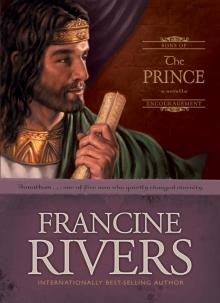 The Prince: Jonathan
The Prince: Jonathan Bridge to Haven
Bridge to Haven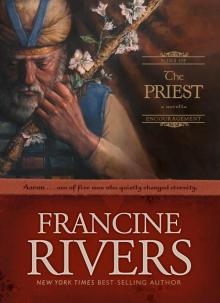 The Priest: Aaron
The Priest: Aaron Her Mother's Hope
Her Mother's Hope Redeeming Love
Redeeming Love The Scarlet Thread
The Scarlet Thread The Masterpiece
The Masterpiece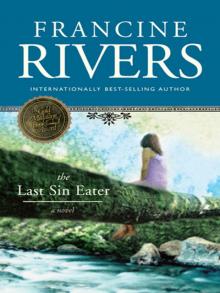 The Last Sin Eater
The Last Sin Eater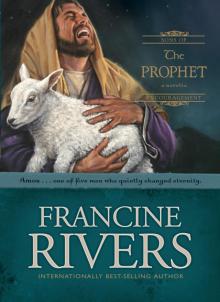 The Prophet: Amos
The Prophet: Amos As Sure as the Dawn
As Sure as the Dawn Her Daughter's Dream
Her Daughter's Dream A Voice in the Wind
A Voice in the Wind The Warrior: Caleb
The Warrior: Caleb The Scribe: Silas
The Scribe: Silas And the Shofar Blew
And the Shofar Blew The Atonement Child
The Atonement Child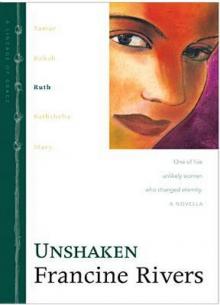 Unshaken_Ruth
Unshaken_Ruth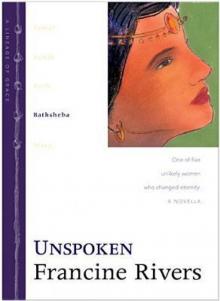 Unspoken_Bathsheba
Unspoken_Bathsheba The Scribe
The Scribe Sons of Encouragement
Sons of Encouragement The Shoe Box
The Shoe Box Sycamore Hill
Sycamore Hill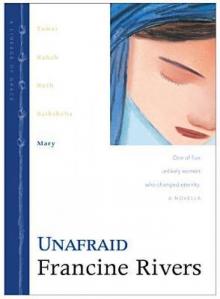 Unafraid_Mary
Unafraid_Mary Marta's Legacy Collection
Marta's Legacy Collection